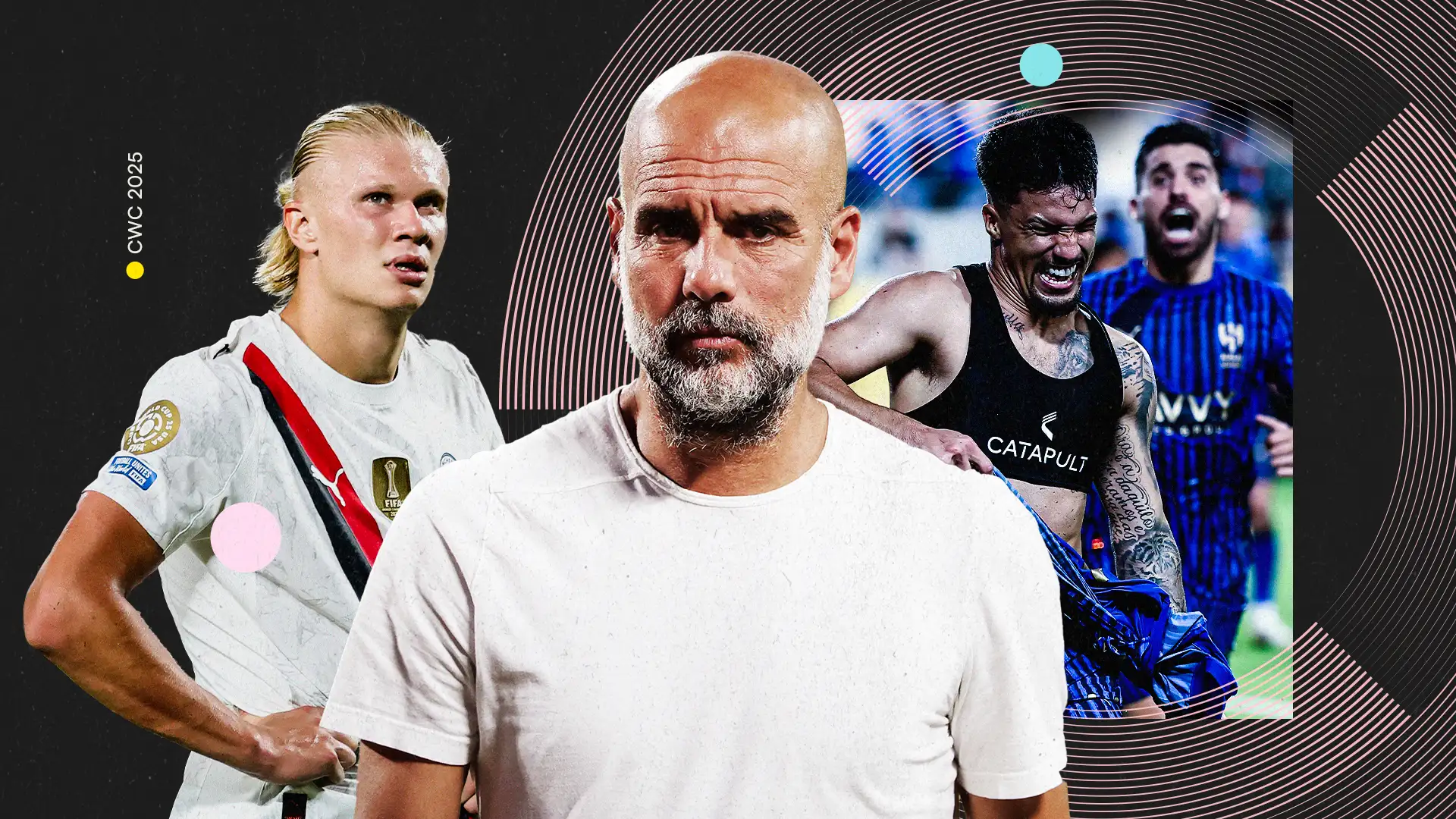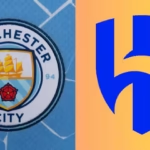Manchester City player ratings vs. Al Hilal: Disaster for Pep Guardiola as Premier League giants crash

In what will undoubtedly be remembered as one of the most shocking results in FIFA Club World Cup history, Saudi Arabia’s Al Hilal produced a performance for the ages to eliminate Manchester City 4-3 after extra time in the Round of 16. The result sent shockwaves through the football world, as Pep Guardiola’s Premier League giants became the tournament’s first major casualty in a match that had everything: controversy, drama, brilliant individual performances, and ultimately, heartbreak for the English champions.
The encounter at Camping World Stadium was a masterclass in how football’s beautiful unpredictability can humble even the most decorated sides. Manchester City, widely considered among the favorites to lift the trophy, found themselves outmaneuvered, outfought, and ultimately outplayed by a Al Hilal side that seemed to grow in confidence with every passing minute.
A Controversial Beginning Sets the Tone
The match began in typical Manchester City fashion, with Guardiola’s men asserting their dominance from the opening whistle. However, the manner in which they took the lead would prove to be a harbinger of the controversy and chaos that would define the evening. Within the first ten minutes, City had found the back of the net through Bernardo Silva, but the goal was shrouded in controversy that would linger throughout the match.
The build-up to Silva’s opener saw not one, but two strong appeals for handball waved away by the referee. Al Hilal players and coaching staff were incensed, gesticulating furiously toward the officials as replays seemed to suggest their protests had merit. Yet the goal stood, and Silva’s close-range finish gave City what appeared to be the perfect start to their Club World Cup campaign.
However, rather than deflating Al Hilal’s spirits, the controversial nature of the opening goal seemed to galvanize the Saudi Pro League champions. Under the guidance of their new manager Simeone Inzaghi, who had taken the reins with the specific mandate of making an impact on the global stage, Al Hilal showed remarkable composure and tactical discipline in their response.
Inzaghi’s Tactical Masterpiece
The appointment of Simeone Inzaghi had raised eyebrows across the football world, with many questioning whether the Italian tactician could adapt his methods to the unique challenges of Saudi Arabian football. Against Manchester City, he provided a resounding answer to those doubts, setting up his team in a formation that perfectly exploited City’s weaknesses while maximizing Al Hilal’s strengths.
Inzaghi’s tactical setup was predicated on absorbing City’s pressure and hitting them on the counter-attack, a strategy that required perfect timing, exceptional fitness levels, and nerves of steel. The Italian had clearly done his homework on Guardiola’s side, identifying the spaces behind City’s high defensive line and the moments when their midfield would be caught out of position.
The absence of Alex Mitrovic, Al Hilal’s talismanic striker who had been instrumental in their domestic success, could have derailed their game plan. However, Inzaghi had prepared for this eventuality, restructuring his attack around the pace and movement of Malcolm and the clinical finishing ability of Marcos Leonardo. This tactical flexibility would prove crucial as the match wore on.
Al Hilal’s Clinical Second Half Transformation
If the first half had been about Al Hilal’s tactical discipline and organization, the second half showcased their clinical edge and mental fortitude. The Saudi side emerged from the halftime break with renewed purpose, and it didn’t take long for their patience to be rewarded.
Marcos Leonardo’s equalizer was a thing of beauty, demonstrating both individual quality and collective understanding. The goal came from a sequence that perfectly encapsulated Al Hilal’s approach – winning the ball back through aggressive pressing, transitioning quickly from defense to attack, and showing composure in the final third. Leonardo’s header was the culmination of this tactical approach, with the Brazilian striker timing his run to perfection and directing his effort beyond the reach of Ederson.
The second goal was even more impressive, with Malcolm producing a moment of individual brilliance that will be remembered for years to come. The Brazilian winger, who had been Al Hilal’s standout performer throughout the match, showed remarkable skill and composure to beat several City defenders before finishing past a stranded Ederson. It was a goal that demonstrated the gulf in class between the old stereotypes of Saudi football and the new reality of a league that has attracted some of the world’s finest talents.
City’s Response and Haaland’s Heroics
To their credit, Manchester City showed the character and quality that has made them one of Europe’s elite clubs over the past decade. Erling Haaland’s equalizer was vintage City, with the Norwegian striker showcasing the predatory instincts that have made him one of the world’s most feared forwards.
The goal came from a moment of chaos in the Al Hilal penalty area, with Haaland reacting faster than anyone else to a loose ball and smashing it into the net with characteristic power. It was exactly the kind of goal that City needed at that moment – a reminder of their quality and a signal that they were far from finished.
The final stages of regular time were a testament to both teams’ commitment to attacking football. Jeremy Doku’s header that sailed just over the crossbar, Mohamed Kanno’s incredible miss from a wide-open position, and Haaland’s 85th-minute effort that required a dramatic goal-line clearance all demonstrated the fine margins that separate success from failure at this level.
Extra Time Drama and Al Hilal’s Triumph
If the 90 minutes had been dramatic, extra time elevated the match to legendary status. The period began with Al Hilal showing remarkable mental strength, taking the lead through Kalidou Koulibaly’s perfectly timed header from a corner kick. The Senegalese defender, whose experience at the highest level of European football proved invaluable, rose between two City defenders to give Al Hilal what looked like a decisive advantage.
Koulibaly’s goal was a masterclass in defensive leadership. Having spent the majority of the match organizing Al Hilal’s backline and repelling City’s attacks, he chose the perfect moment to venture forward and make a crucial contribution at the other end of the pitch. His positioning and timing were impeccable, and his header gave Ederson no chance.
City’s response came through Phil Foden, who demonstrated why he is considered one of England’s brightest talents. The young midfielder’s equalizer was a moment of pure class, with Foden showing exceptional technique to steer an angled cross into the net. For a brief moment, it appeared that City’s experience and quality might carry them through to the quarter-finals.
However, Al Hilal had saved their best for last. Marcos Leonardo’s second goal of the night, scored in the 112th minute, was the culmination of everything that had made the Saudi side so dangerous throughout the match. The Brazilian striker’s ability to react first to a loose ball and bundle it over the line demonstrated the hunger and determination that had carried Al Hilal to this historic victory.
Individual Performances That Defined the Night
Al Hilal’s Heroes
Malcolm’s performance will be remembered as one of the finest individual displays in Club World Cup history. The Brazilian winger was a constant threat throughout the match, using his pace and skill to torment City’s defense. His goal was a moment of individual brilliance, but his overall contribution went far beyond that single moment. Malcolm’s work rate, creativity, and ability to maintain his performance level over 120 minutes of intense football made him the standout player on the night.
Marcos Leonardo proved to be the perfect foil for Malcolm, with his two goals showcasing different aspects of his game. His first goal demonstrated his aerial ability and positional awareness, while his winner showed his determination and opportunism. The Brazilian striker’s movement throughout the match caused constant problems for City’s defense, and his clinical finishing proved to be the difference between the two sides.
Kalidou Koulibaly’s performance was a masterclass in defensive leadership. The Senegalese defender not only organized Al Hilal’s backline superbly but also contributed the crucial goal that temporarily put his side ahead in extra time. His experience and composure were evident throughout the match, and his ability to perform on the biggest stage proved invaluable for Al Hilal.
Manchester City’s Mixed Bag
For Manchester City, the performance was a study in contrasts. Tijjani Reijnders emerged as their standout performer, controlling the tempo in midfield and showing the kind of composure that had made him such a sought-after talent. His contribution to City’s first goal was crucial, and his overall performance demonstrated why Guardiola had been so keen to secure his services.
Ruben Dias, despite being on the losing side, showed his class with several crucial interventions that prevented Al Hilal from extending their lead at various points in the match. The Portuguese defender’s composure and reading of the game were evident throughout, and he made one particularly vital tackle that prevented what would have been a certain Al Hilal goal.
However, other City players struggled to reach their usual standards. Matheus Nunes’ performance at right-back highlighted why he is not naturally suited to that position, with his defensive positioning and awareness causing problems throughout the match. His side was badly exposed for Al Hilal’s second goal, and his overall contribution fell well short of what City needed from that position.
Tactical Analysis: Where It Went Wrong for City
Pep Guardiola’s tactical approach, while typically sophisticated, ultimately proved insufficient against Al Hilal’s well-organized and disciplined game plan. City’s high defensive line, which has been so effective in domestic competition, was repeatedly exploited by Al Hilal’s pace on the counter-attack. The Saudi side’s ability to transition quickly from defense to attack caught City’s defenders out of position on multiple occasions.
The decision to play Matheus Nunes at right-back, while understandable given City’s injury concerns, proved to be a significant weakness that Al Hilal ruthlessly exploited. The Portuguese midfielder’s unfamiliarity with the defensive requirements of the position was evident, and his positioning often left City vulnerable to Al Hilal’s attacks down that flank.
City’s midfield, typically so dominant in possession, struggled to cope with Al Hilal’s aggressive pressing and quick transitions. Ilkay Gundogan, while effective when City had the ball, became a liability out of possession, struggling to track back and provide defensive cover when needed.
The Broader Implications
This result represents more than just a single match upset; it signals a seismic shift in the global football landscape. Al Hilal’s victory over Manchester City demonstrates the growing competitiveness of leagues outside Europe’s traditional powerhouses and validates the significant investments made in Saudi Arabian football over recent years.
The Saudi Pro League’s ability to attract world-class talents like Malcolm, Leonardo, and Koulibaly is clearly paying dividends on the pitch. These players brought not just individual quality but also experience of competing at the highest level, which proved crucial in the pressure-cooker atmosphere of knockout football.
For Manchester City, this defeat will serve as a harsh reminder that reputations count for nothing in knockout football. Despite their domestic dominance and European pedigree, they were outplayed by a side that many would have considered significant underdogs before kick-off.
Looking Ahead
As Al Hilal progress to the quarter-finals, they carry with them the hopes of Asian football and the belief that they can continue their remarkable journey. Their victory over Manchester City has announced their arrival on the global stage in the most emphatic way possible.
For Manchester City, the focus will quickly turn to domestic matters and their pursuit of further success in the Premier League and other competitions. However, this defeat will undoubtedly serve as a learning experience for Guardiola and his players, highlighting areas that need improvement if they are to achieve their ultimate goal of Champions League glory.
Conclusion: A Night That Rewrote History
The 4-3 defeat to Al Hilal will go down as one of the most significant results in Manchester City’s recent history, not because of its immediate impact on their season, but because of what it represents. It serves as a reminder that football’s beauty lies in its unpredictability, and that on any given night, the supposedly impossible can become reality.
Al Hilal’s victory was built on perfect preparation, tactical discipline, individual brilliance, and collective determination. They showed that with the right approach and mindset, any team can compete with the world’s best. Their performance will inspire teams across Asia and beyond, proving that the global game is becoming increasingly competitive and unpredictable.
As the dust settles on this remarkable encounter, one thing is certain: Al Hilal’s name will forever be etched in Club World Cup folklore as the team that stunned Manchester City and reminded the football world that beautiful games can come from the most unexpected places.
The Saudi Pro League champions have not just won a football match; they have won hearts, minds, and respect across the global football community. Their journey continues, but whatever happens next, they have already achieved something truly special – they have shown that dreams can become reality with the right combination of talent, tactics, and unwavering belief.















